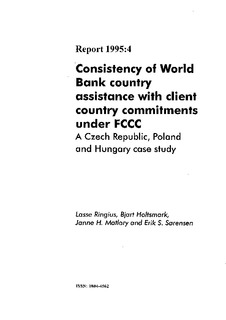Consistency of World Bank country assistance with client country commitments under FCCC: A Czech Republic, Poland, and Hungary case study
Abstract
The report evaluates the consistency of World Bank country assistance strategies with client country commitments under the United Nations Framework Convention on Climate Change (FCCC) in the cases of the Czech Republic, Poland, and Hungary. The national communications from the three countries are reviewed and the principal policy directions in essential sectors are highlighted. Moreover, the principal World Bank country assistance strategies in the three countries are analyzed.
The report concludes that the World Bank assistance to the three client countries in broad terms are consistent with the policies outlined in the national communications. However, the report points to the fact that while some of the World Bank projects will contribute to reductions in greenhouse gas emissions in the short term, the long term consequence of a large investments project in the power generating sector in the Czech Republic might have the opposite effect. In the case of Hungary the report points to the planned World Bank support for investments in public transport as examples of projects that are reinforcing the national climate policy.
